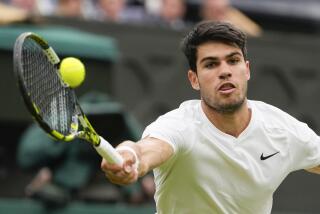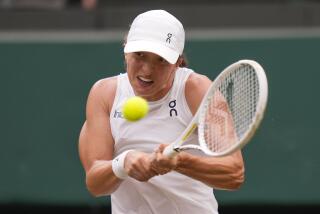Soviets Are Back in Tennis : Natalia Zvereva, 16, Advances to Round of 16 at Wimbledon
- Share via
LONDON — Way out on Court 17, a few yards from where the grounds of the All England Club turn into a sea of sponsor tents, two women had been playing for about 30 minutes. There are few places to sit, just some wooden benches, so people tend to come and go.
But this match had drawn a crowd. And, looking around, one could see that many of the spectators were teen-age boys, a number of them Wimbledon ballboys. The object of their attention was a tall girl with a blue ribbon in her ponytailed hair and a wicked forehand.
Her name is Natalia Zvereva. She turned 16 in April and she is in the round of 16 at Wimbledon. Teen-agers doing well in women’s tennis is hardly something new. But this is different. She is from Minsk, USSR.
The Russians are back in tennis. Zvereva and Alexander Volkov, who is 20 years old, have reached the fourth round here. But their success is just part of a rebuilding program the Soviet Union began five years ago when tennis was reinstated as an Olympic sport.
“The Olympics are the most important event for us,” Volkov said Saturday after upsetting 12th-seeded Brad Gilbert. “That is the main reason we are playing international again. For a long time, I thought I would never get a chance to play out of my country.”
The Soviets pulled out of international play in 1976, saying they were afraid of reprisals from other countries because they let their players compete on a tour that included South Africans. The pullout came three years after Alex Metreveli reached the final here and two years after Olga Morozova reached the final here and in the French Open.
For six years, there were no Soviets on the tennis tour. In 1982, when tennis again was made an Olympic sport, first as a demonstration sport in 1984, then a full-fledged medal sport in 1988, the Soviet tennis program was reborn.
“There has always been good tennis in the Soviet Union,” said Larisa Savchenko, the top-ranked Soviet player. “But in the last four years we have been able to get the experience we need to improve.”
The rebuilt Soviet program first attracted attention in 1985 when Andrei Chesnokov upset Eliot Teltscher, then a top-15 player, at the French Open. Since then, Chesnokov, who is 21, has reached the quarterfinals at the French Open last year and the U.S. Open round of 16. He has been ranked No. 30 in the world, although he now is No. 49.
Now, Chesnokov has company. In all, there are nine Soviet men with computer rankings. Chesnokov is the only one in the top 100 but Volkov’s performance here will vault him from No. 503 into the top 200.
The women are even farther along. Savchenko and Svetlana Parkhomenko have been full-time members of the women’s tour since 1983. They are an excellent doubles team, one of the 10 best in the world, and both have had success in singles. Savchenko, who lost in the second round here, is ranked No. 22 in the world. In all there are four Soviet women in the top 100: Savchenko, Zvereva (who will advance from No. 53), Natalia Bykova (No. 78) and Parkhomenko (No. 95).
“When they first came out here they stayed apart from everyone, they were very quiet, almost dour,” said Molly Van Nostrand, watching doubles partner Ann Henricksson lose to Zvereva. “Now, though, they’re a lot more confident. I think they enjoy themselves out here. I think they’re really nice girls.”
Savchenko, 20, is the leader of the group. She is a stocky powerhouse of a player, 5 feet 2 and 135 pounds, and her English is stronger than the other players’. She is demonstrative on and off the court with a quick sense of humor.
And she is blunt. “Why is it,” she asked a reporter recently, “that we all work to learn English but no Americans work to learn Russian?”
Naturally, the Soviet players are watched closely when they travel. There is a constant stream of “coaches” traveling with them, usually at least one for every two players at a tournament.
They are mysterious at times. The players are listed as amateurs, but Chesnokov said last year that he gets to keep a large chunk of his prize money. Reportedly, he was reprimanded for saying that publicly. This year, 10 days before the Wimbledon withdrawal date, the Soviet Federation called Wimbledon to say Chesnokov was injured and would not play Wimbledon. A week later they called back and said he was healthy and would play.
But you cannot withdraw and re-enter. Chesnokov was offered a chance to qualify. The offer was turned down and Chesnokov is not here. The others are here and all admit to being a little homesick.
“It is very hard,” said Parkhomenko, 24 and married for two years. “I miss home. I miss my husband (a Greco-Roman wrestling coach) and I miss my dogs. But traveling is fun, too. Next week we are all going to see Genesis.”
All the players speak some English and all have become, to a degree, Westernized. Chesnokov was almost hysterical at a tournament last year when he thought he had lost his Walkman. Zvereva wears a Madonna button on her clothes and admits her favorite meal is steak and french fries. Savchenko’s hairstyle borders on punk.
The Soviet tennis system, according to the players, is not that much different than it is in other sports. “The coach comes into your school and asks who wants to play tennis,” Savchenko said. “You go out and play and the best ones get to play all the time. In my town (Lvov in the Ukraine), there were only about two or three of us playing after the first few days.”
Morozova is in charge of the Soviet junior program, which most recently has produced Zvereva, who won the junior title here last year and the French junior this year. “Every year there are more juniors playing,” Savchenko said. “We should be having more and more good players in the next years.”
At least once a year all the top Soviet players get together in Moscow for a three-week training program that, all agree, is exhausting. “We play like six hours a day,” Zvereva said. “The rest of the time we are working out. It is very hard.”
Other tour players say that when the Soviet players come back on the tour after one of these camps they have improved noticeably. Volkov, who started playing when he was 10, hit the ball two-fisted on both sides until he was 18. Only in the last two years has he started to hit his forehand with one hand.
“My coaches told me that against the best players I had to hit the ball with one hand or I wouldn’t have a chance,” Volkov said. “They were right. Until this tournament, though, I haven’t done so well.”
Volkov lost in the first round of qualifying here a year ago to Larry Stefanki. This year he played him in the first round of the main draw and beat him. This is pretty good stuff for a player who has played three grass court tournaments in his life--here the last two years and Australia in January. The success of the Soviets on grass is all the more remarkable when one realizes that there are no grass courts in the country.
“We prefer the clay courts,” Parkhomenko said. “It is more comfortable for us. But next to the Olympics, Wimbledon is the most important tournament for us, so we do our best.”
A little over a year ago, after lengthy negotiations, the Soviet federation signed a deal with ProServ, the Washington-based management group, to represent their players. ProServ is trying to put together a Grand Prix tournament in Moscow and is setting up an exhibition there this fall that will involve client Jimmy Connors and Chesnokov.
Recently, after another lengthy series of negotiations, ProServ and the Soviets signed a deal with Nike to wear their equipment and clothes. But the women don’t like the new dresses. They say they aren’t very comfortable. So, two weeks ago at Eastbourne, they didn’t wear them. So far at Wimbledon, they have.
The Soviets are throwing in with a capitalist management group, signing promotional contracts, going to Genesis concerts. For the players, it is all a boon. As youngsters, they worried that they might not get to leave their country.
“Six years is not six months, it is a long time,” Savchenko said. “Until the Olympics, we wondered if we would travel. We are all glad we are and we are looking forward to the Olympics. We don’t worry about what will happen (in Seoul). I think it is no problem. We just want to play.”
The Soviet women have been told that if they can at least reach the quarterfinals of the Federation Cup in Vancouver next month, they will be sent as a unit to the Olympics. That would mean the team would be Savchenko, Parkhomenko and Zvereva.
Zvereva probably has more potential than the other Soviets. The daughter of two tennis coaches, Zvereva began playing when she was 7. Her father was a big fan of Bjorn Borg and taught her to hit topspin. She hits nothing but topsin off her forehand today, but she hits hard and is not afraid to attack. She definitely is not a backboard, just keeping the ball in play all day.
“She has a lot of game,” Van Nostrand said. “Especially for such a young player.”
Zvereva may just be the first true Soviet star. Although Metreveli and Morozova were good players, neither had the personality or the appeal to draw a lot of attention. And, neither had an agent. Zvereva has all those things. And if she blossoms in time for the Olympics, she could emerge as a big name in tennis.
The Soviets understand this. They have scheduled Zvereva for three months in linguistics school next winter to learn English.
“I am still not a world player,” she said. “When people tell me I am good, I’m very happy. But I’m not as good as Savchenko or Parkhomenko yet. I still look up to many players, especially Chris (Evert) and Martina (Navratilova). They are always so nice to me.”
Most of the players on the men’s and women’s tours say they enjoy the Soviet players. “I’ve practiced with Chesnokov several times and I really like him,” Tim Mayotte said. “I think it’ll be great having them in the Olympics. That’s what sports is supposed to be about, right? Bringing people together from different countries and finding out they’re just regular people. I think it’s great that they’re out here.”
For tennis, the new Soviet presence is certainly a boon. For the Soviets, always looking for good international publicity, the new awakening has gone over superbly. And for the teen-age boys lurking whenever Zvereva plays, it isn’t such a bad deal, either.
More to Read
Go beyond the scoreboard
Get the latest on L.A.'s teams in the daily Sports Report newsletter.
You may occasionally receive promotional content from the Los Angeles Times.






